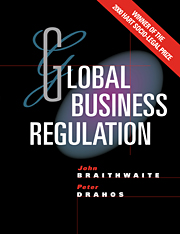1 - The Historical Canvas
Published online by Cambridge University Press: 04 August 2020
Summary
Most of the significant globalization of rules occurred in the twentieth century, particularly since 1970. This globalization has proceeded furthest with business regulation because of imperatives such as those of international trade, saving the planet from environmental collapse and regulating nuclear and chemical weapons. Still, most of the rules that have the greatest effect on our lives are extremely local - the rules that regulate our family lives, workplaces and neighbourhoods. The globalization of business regulation has been a historically uneven process. While the globalization of business rules has been mostly partial and recent, the globalization of many of the foundation concepts in the laws that regulate business has been total and existed for centuries. For example, all states have elaborate written laws enforceable by institutions called courts, where outcomes can be tested under the guidance of rules of evidence. Once those laws were carved in stone; now they are universally printed on paper; soon they will be universally accessible electronically. We know of no contemporary national legal system that does not confer powers on a central bank, that does not tax centrally, that does not have a concept of a legally enforceable contract or of crime. Legal systems do vary (though decreasingly so) according to whether business corporations can be conceived as having committed a crime, but they all enforce sanctions against corporations collectively (as distinct from only against their individual owners). So we need to be careful, in detecting differences in the world, not to lose sight of the fact that many of the fundamentals of business regulation are utterly global.
Outside Europe and the US, even at the level of rules, the extent to which states have become rule-takers rather than rule-makers is greater than most citizens think, largely because when governments announce new regulatory laws they are somewhat embarrassed to disclose that the national legislature voted for those laws without having any say in shaping them. As Australian authors, we note, for example, that for years some of Australia's air safety standards have been written by the Boeing Corporation in Seattle, or if not by that corporation, by the US Federal Aviation Administration in Washington. Australia's ship safety laws have been written by the International Maritime Organization in London, its motor vehicle safety standards by Working Party 29 of the Economic Commission for Europe and its food standards by the Codex Alimentarius Commission in Rome.
- Type
- Chapter
- Information
- Global Business Regulation , pp. 3 - 6Publisher: Cambridge University PressPrint publication year: 2000
- 1
- Cited by



